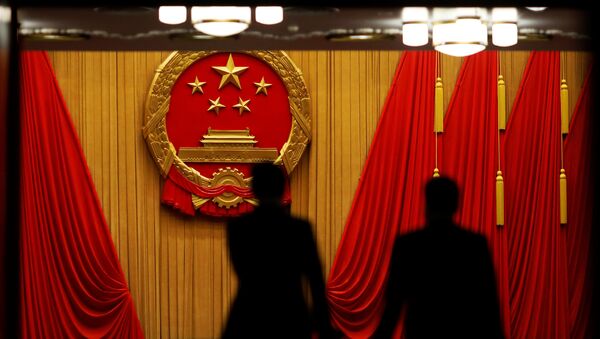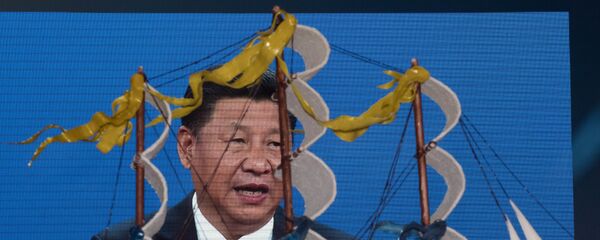Sputnik: Did the announcement that China’s president will no longer be limited to two consecutive terms come as a surprise to you?
Kerry Brown: It had been kind of preannounced about a week ago, but when that happened most people were surprised because it's quite early, it's for a symbolic position, presidency is not a powerful position in China, so some people speculate that it's to regularize things, the president is usually a more powerful position; in Russia it is, in America it is in a sense, it kind of acknowledges that presidency should be an important position, of course, it is a sort of declaration of intent by the incumbent at the moment Xi Jinping.
READ MORE: China's Presidential Term Vote Could Herald Start of 'Massive Changes' — Analyst
Sputnik: Apparently it was something that was in the pipelines around the time of the 19th party congress in China, it only happened now, I'm wondering about the timing, does it have anything to do with it?
Kerry Brown: Yes, it was apparently discussed at the party congress but no-one knew that until an announcement in English in Xinhua about ten days ago. A consensus had been built up that people didn't know about so to anyone who says that they know what's going on in China, they have to acknowledge that these discussions happen completely away from the gaze of the public and no one in the West knew about this and not many people in China until about ten days ago. What's about the timing now, well I suppose you could say that this is a period when China is going very-very well, the politics of China is quite stable, Xi Jinping has stabilized his hold on power, he's not going to get a lot of opposition, I think the vote had two people opposed to it and 2,900 plus supporting it at the congress, so it's a time when the sun is shining, the harvest is good, so you may as well do this kind of things now.

Sputnik: Do you think this is more of a symbolic measure or is it going to bring some radical changes to China?
Kerry Brown: Symbolism matters anywhere, symbolism is not just about symbols, it's about the real things, so what will this do, it will mean that the Xi Jinping leadership's philosophy which is kind of to increment, to produce more reform but make the one-party system sustainable, this is going to continue, there's going to be no variation from that. Sustainability of one-party rule – is that really going to be possible? It's not really been possible anywhere else for very long, this is what the party is going to try and achieve, it doesn't really accept any other kind of competition for power. It might be that we can see more surprising things, what we have learned from the Xi Jinping's leadership is to expect the unexpected. We've all said, most commentators, that political reform doesn't seem to be on the cards, but maybe by making the state position more powerful, the presidency having more accountability will be a step towards some kind of political reform. We should not take the obvious story which is that this is about the emergence of an autocrat, a dictator the one and only story, it could be about making institutional structures even stronger in a way that we haven't considered, we just have to expect the unexpected.
Sputnik: The amendment also establishes institutional changes, for example, a new body prosecuting corruption, do we know more about the actual institutional changes that will follow?
Sputnik: Xi Jinping's has been enjoying a significant degree of public support as well because his tough attitude, his crackdown on official corruption won him a degree of public support.
Kerry Brown: Yes, he's popular in as much as the story that he represents of China being a powerful, strong country for the first time in modern history and having a status, that's a popular story and he gets his power from that, so he's a nationalist in the sense that he wants China to never again be a victim, to never be pushed around, he wants space for China, he wants the status of superpower, whether that's going to be a kind of hard-power superpower, that’s not clear at the moment, it's in the market to be a status superpower, he wants China to have status and the Chinese people want China to have status, so there's an alignment there.
Sputnik: China remains among the world's top economies would you say that Xi Jinping's indefinite rule would make it even more powerful economically, politically?
Kerry Brown: So everyone talks about Xi Jinping's indefinite rule, the presidency means that you can stay there without time limits, it's likely he'll do that, but there's no Xi Jinping's indefinite rule at the moment, we don't know that until 3-4 years time. What they've really committed to is to incremental reforms, is to trying to make state enterprises more hybrid, trying to make the central government and the local governments to have more flexible arrangements, trying to basically create more spaces for growth in the Chinese economy, the huge important stories, the rise of the Chinese middle class, they will want good healthcare service, good welfare services, decent environment, and all these things have to be delivered and their expectations are very high. The growth is meant to be 6,5 percent but the quality of growth can be variable and it's a big transition towards the service sector consuming economy rather than a manufacturing one that exists until now, so these are huge transitional issues and China has a big job to try and create for the first time in modern history a Chinese service sector high consuming economic model.
READ MORE: US-China Trade Standoff: Journalist Predicts Beijing’s 'Tit-for-Tat Retaliation'
Sputnik: Obviously long-term it's hard to forecast anything, but in the near future do you forsee a flurry of activity and change in China that will follow from this measure?
Kerry Brown: So China wants to be a powerful, strong, great country and that will have huge impact in on region and the world, it's not going to back down that desire and it's going to do things that the world will need to think hard about how it to responds to, some of those will be greatly in the world's benefit, its involvement for instance in the environment free trade deals, globalization agenda, but we have to remember at the heart of this is the mission by China for Chinese to create a powerful, strong, great country and the world either gets used to that or it has to think how on earth to contest it, contesting it won't be easy, that's the key story that we are going to see, that China, which will be at the heart of world development for the next decades into the 21st century.




